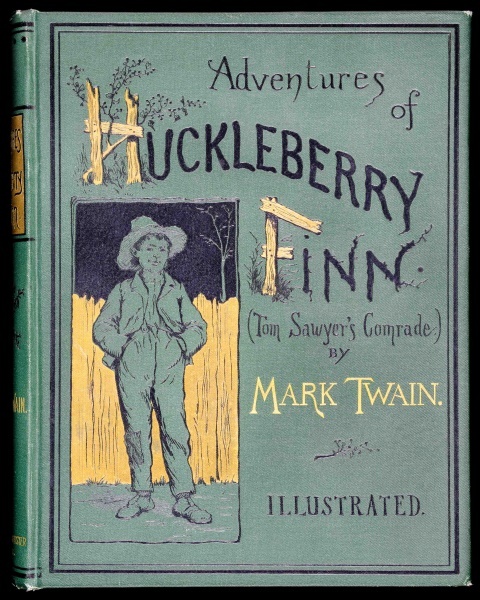Twain: ‘Adventures of Huckleberry Finn’
This sequel to The Adventures of Tom Sawyer was initially marketed as a “boy’s book,” but its larger impact was quickly realized. Considered one of the most significant works of the American literary tradition for its faithful but satirical depiction of the antebellum American South, it has likewise drawn criticism for its use of racial epithets and stereotypes.
At the center of the novel is Huckleberry Finn, a poor 13- or 14-year-old white boy, motherless and the son of a drunkard, who sets out on a journey that on one level is simply an escape from the strictures of his adopted family but on another level is a journey of moral awakening. Huck’s voyage on a raft down the Mississippi River with Jim, a friend and escaped slave, also comes to represent for Twain the coming-of-age struggles of an adolescent America.
Switching between the first-person narration of Huck and third-person narration from an adult viewpoint, the novel provides the reader with the intimate and fresh perspective of a youth contrasted with the nostalgic adult’s. The raft and river themselves act as idyllic refuge for the fugitive Jim and the dual outcast/renegade Huck as he tests out the restrictive and at times morally suspect small-town environments they encounter.
Critics then and now have praised Adventures of Huckleberry Finn for its realistic representation of regional dialect while likewise criticizing its coarseness in depicting the everyday life of the American South. This coarseness has also caused the book to be banned for vulgar language when it was initially released and more recently for its treatment of race. Some critics argue that the satirical representation of a racist society in the novel reveals the logical fallacies that underpin slavery, while the moral transformation of Huck and the humanizing portrayal of Jim also send an anti-racist message. Others describe Jim’s character as stereotypical and fault the novel for its frequent use of the word “nigger.” As recently as 2009, groups have questioned the book’s inclusion in libraries and school curriculum. Despite the continuing controversies, Twain’s Adventures of Huckleberry Finn has proven to have a lasting legacy as an American masterpiece.
—Kara Getrost, PhD, Lecturer, English
Excerpt from Mark Twain's "Adventures of Huckleberry Finn" read by Herbert Martin, Professor Emeritus. University of Dayton. Department of English

